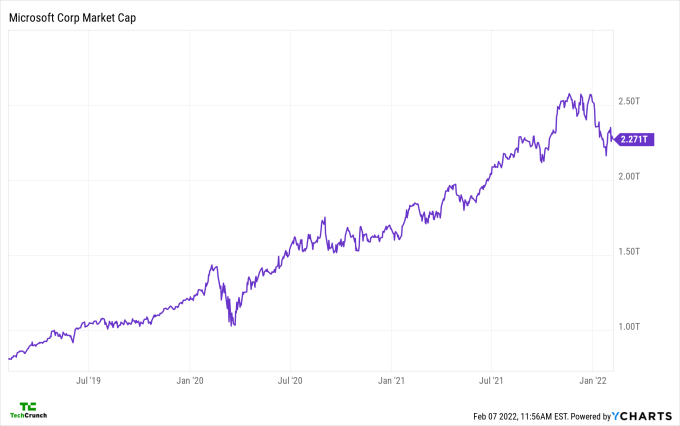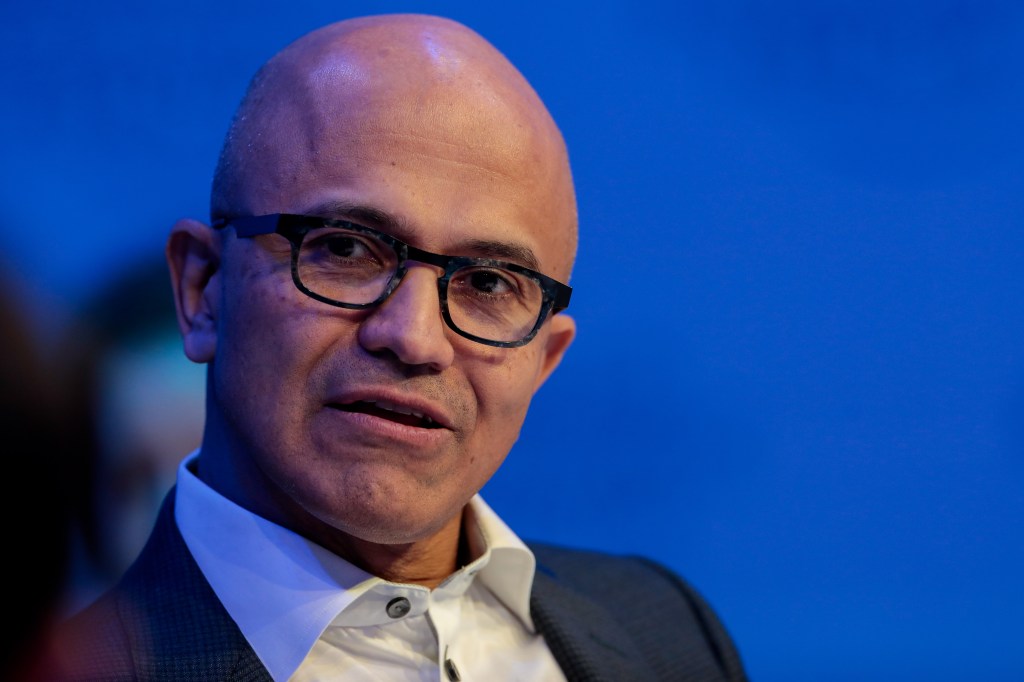It’s easy to forget that Microsoft used to stumble from time to time, especially when you look at its gaudy $2 trillion market cap today. Around 2010, four years before Satya Nadella would succeed Steve Ballmer as CEO, the company pretty much completely missed the mobile boat.
When Nadella came on board as CEO eight years ago, his mission seemed to be to make damn sure the company didn’t make the same mistake with the cloud. One way to do that would be to throw money at the problem, and just buy the companies to make the path easier.
Since its founding, Microsoft has acquired 250 companies, according to Crunchbase data, but most of the biggest deals, totaling $5 billion or more, have come during Nadella’s tenure. The two exceptions were Nokia and aQuantative, both of which happened under Ballmer, and neither worked out very well.
The three biggest, including the $69 billion Activision deal announced in January, the $26 billion deal for LinkedIn in 2016, and the $20 billion purchase of Nuance Communications last year all happened with Nadella in the corner office.
Microsoft has long had the resources and capability to handle multiple large businesses, as Jared Spataro, corporate vice president for Office 365, pointed out in his TC Sessions: SaaS interview last year: “The context for Microsoft had been our ability to develop multiple, very large businesses that ran in parallel. So this idea that we had multiple billion-dollar-plus businesses [like the] Windows business and Office businesses … Even a server business associated with productivity [certainly helped].”
Those resources have grown dramatically as the company’s market cap has soared. Consider that since I covered Nadella’s five-year anniversary in 2019, the company’s public market value has grown from just over $800 billion to over $2 trillion. That kind of growth gives you a lot of options, which Nadella has certainly taken advantage of.

As Microsoft looks to expand its hold on gaming with the Activision purchase, and healthcare with Nuance Communications, it could start to run into some regulatory pressure. In fact, the Nuance purchase is tied up in the U.K. under the scrutiny of the Competition and Markets Authority.
When a company has this much financial clout, it can pretty much push its way into any market. The challenge for Nadella and Microsoft in the years ahead will be navigating increasing regulatory oversight while working to keep the company broadly diversified.
The big question at this point could be where Microsoft will go next. Perhaps Nadella will try to enhance the enterprise SaaS side of the business where Microsoft Dynamics has lagged, using its firepower to buy a big name SaaS company, something I speculated Amazon might do at some point this year in my 2022 predictions post.
We know that Salesforce is always active, so it wouldn’t be a huge surprise if Microsoft tapped into its treasure chest to buy additional enterprise SaaS market share.
Shifting to the cloud
One of the main growth levers Microsoft has tapped under Nadella has been its cloud businesses. The company has gone from being a minor player in the cloud infrastructure market to holding a strong second place. As recently as 2017, the company owned just 11% of that market, far behind primary rival Amazon, but it has increased its share to 21% as of Q4 2021, according to data from Synergy Research.
Last quarter, its cloud infrastructure revenue rose 45% to reach $10 billion, compared with Amazon’s $17 billion and Google’s $5 billion. Microsoft has grown a substantial infrastructure business under Nadella’s leadership, but he hasn’t been content to sit on just his cloud infrastructure business spoils.
The company also moved Office, its wildly popular suite of products that includes Word, PowerPoint and Excel, to the cloud. In its most recent earnings report filed last week, the Productivity and Business Processes category reached almost $15 billion for the quarter, up 25% from a year earlier. While Microsoft throws a lot of stuff into this category, including LinkedIn and Dynamics, Office very likely brought in most of the revenue.
While the shift to the cloud had already begun before Nadella took over — in fact, his title before being promoted was “Executive Vice President of Cloud and Enterprise” — he changed the way the company works, encouraging cooperation instead of internal competition between departments.
At TC Sessions: Saas last year, Spataro explained just how much Nadella’s leadership has influenced the company’s cloud transformation:
He also did something that I thought was really amazing, where he really started to bring the company and resources together, as opposed to just separate siloed business units, to try and execute more effectively together. And so effectively being kind of a force multiplier between our businesses as opposed to competition between your businesses, and that unlocked a lot of potential for Microsoft.
Nadella’s impact on the company has been dramatic, enabling it to move from an organization primarily focussed on boxed software and on-prem servers to one firmly focused on the cloud. Microsoft has performed well during Nadella’s eight-year tenure, but as it faces regulatory headwinds across the world, his next couple of years could be defined by how well he navigates this climate while continuing to push Microsoft into new markets via acquisitions.































Comment